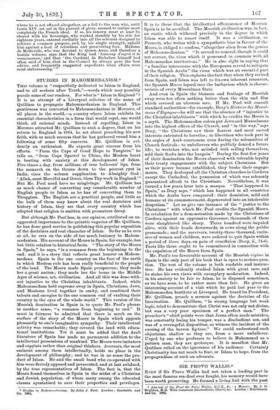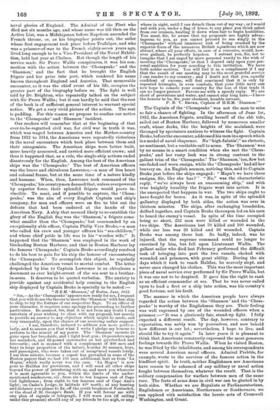SIR PROVO WALLIS.*
EVEN if Sir Provo Wallis had not taken a leading part in the most famous sea-duel ever fought, his memory would have been worth preserving. He formed a living link with the past • Admiral of the Fleet Sir Provo Wallis, G.C.B.,Sc.: a Memoir. By J. G. M.D. With numerous Illustrations, Charts, Sc. London Hutchinson utCo. 1292,
naval glories of England. The Admiral of the Fleet who died not six months ago, and whose name was till then on the Active List, was a Midshipman before Napoleon ascended the French throne, or, as his biographer points out, the sailor whose first engagement took place before Trafalgar, and who was a prisoner-of-war to the French eighty-seven years ago, lived long enough to be a Vice-President of the Naval Exhibi- tion, held last year at Chelsea. But though the length of his service made Sir Provo Wallis conspicuous, it was his con- nection with the action between the 'Chesapeake' and the Shannon,' and the fact that he brought the English frigate and her prize into port, which rendered his name known throughout England and America. That memorable encounter, as it was the chief event of his life, occupies the greater part of the biography before us. The fight is well
told by Dr. Brighton, who repeatedly talked on the subject with Sir Provo Wallis ; but it can hardly be said that thereat
of the book is of sufficient general interest to warrant special notice. We get a very vivid picture of the action. The rest is padding. For this reason we propose to confine our notice to the 'Chesapeake' and 'Shannon' incident.
Our readers will remember that at the beginning of that ever-to-be-regretted civil war, for civil war in truth it was, which was waged between America and the Mother-country from 1812 to 1814, the Americans were repeatedly victorious in the naval encounters which took place between them and their antagonists. The American ships were better built, more heavily armoured, and carried more efficient crews; and thus it happened that, as a rule, the single-ship actions ended disastrously for the English. Among the best of the American ships was the Chesapeake.' The best of American officers was the brave and chivalrous Lawrence,—a man of lion heart and colossal frame, but at the same time of a nature kindly and humane. When, then, Lawrence took command of the 'Chesapeake,' his countrymen deemed that, unless overpowered by superior force, their splendid frigate would prove in- vincible. To meet, and if possible to capture, the Chesa- peake,' was the aim of every English Captain and ship's company, for men and officers were on fire to blot out the defeats that had been endured at the hands of the American Navy. A ship that seemed likely to re-establish the glory of the English flag was the Shannon,' a frigate some- what smaller than the Chesapeake,' but commanded by an exceptionally able officer, Captain Philip Vere Broke,—a man who called his crew and younger officers his "sea-children," and whose chief pride in life was in his "wooden wife." It happened that the 'Shannon' was employed in the work of blockading Boston Harbour, and that in Boston Harbour lay the famous Chesapeake.' Captain Broke accordingly resolved to do his best to gain for his ship the honour of encountering the Chesapeake.' To accomplish this object, he regularly challenged the American vessel to mortal combat. The letter despatched by him to Captain Lawrence is as chivalrous a document as ever knight-errant of the sea sent to a brother- in-arms. It deserves to be quoted verbatim. The anxiety to provide against any accidental help coming to the English
ship displayed by Captain Broke is specially to be noted :— "H.B.M. ',Shannon,' off Boston, June, 1818. " Sta,—Aa the Chesapeake 'appears now ready for sea, I request that you will do me the favour to meet the 'Shannon' with her, ship to ship, to try the fortune of our respective flags. To an officer of your character, it requires some apology for proceeding to further particulars. Be assured, Sir, that it is not from any doubt I can entertain of your wishing to close with my proposal, but merely to provide an answer to any objection which might be made, and very reasonably, upon the chance of our receiving unfair support. I am, therefore, induced to address you more particu- larly, and to assure you that what I write I pledge my honour to perform to the utmost of my power. The 'Shannon' mounts 24 guns upon her broadside, and 1 light boat gun; 18-pounders upon her maindeck, and 32-pound carronades on her quarterdeck and forecastle ; and is manned with a complement of 300 men and boys (a large proportion of the latter), besides 30 seamen, boys, and passengers, who were taken out of recaptured vessels lately. I am thus minute, because a report has prevailed in some of the Boston papers that we had 150 men additional, lent us from La Hogue,' which really never was the case. La Hogae ' is now gone to Halifax for provisions, and I will send all other ships beyond the power of interfering with us, and meet you wherever it is most agreeable to you, within the limits of the under- mentioned rendezvous, viz, from six to ten leagues east of Cape Cod lighthouse ; from eight to ten leagues east of Cape Ann's light; on Cube's Ledge, in latitude 43° north ; at any bearing and distance you please to fix, off the south breakers of Nantucket, or the shoal of St. George's Bank. If you will favour me with any plan of signals Iv telegraph, I will warn you (if sailing under this promise) should any of my friends be too nigh, or any. where in sight, until I can detach them out of my way ; or I would sail with you, under a flag of truce, to any place you think safest from our cruisers, hauling it down when fair to begin hostilities. You must, Sir, be aware that my proposals are highly advan- tageous to you, as you cannot proceed to sea singly in the 'Chesapeake without imminent risk of being crushed by the superior force of the numerous British squadrons which are now abroad, where all your efforts, in case of a rencontre, would, how- ever gallant, be perfectly hopeless. I entreat you, Sir, not to imagine that I am urged by mere personal vanity to the wish of meeting the 'Chesapeake,' or that I depend only upon your per- sonal ambition for your acceding to this invitation. We have both nobler motives. You will feel it as a compliment if I say that the result of our meeting may be the most grateful service I can render to my country ; and I doubt not that you, equally confident of success, will feel convinced that it is only by repeated triumphs, in even combats, that your little navy can now hope to console your country for the loss of that trade it can no longer protect. Favour me with a speedy reply. We are short of provisions and water, and cannot stay long here.—I have the honour to be, Sir, your obedient, humble servant, P. B. V. BROKE, Captain of H.B.M. ' Shannon.' "
The Captain of the 'Chesapeake' was not the man to miss so fair a chance of fighting. In the afternoon of June 1st, 1813, the American frigate, availing herself of the ebb tide,.
sailed out of Boston Harbour, followed by numerous smaller craft, whose decks, like the heights of the mainland, were thronged by spectators anxious to witness the fight. Captain Broke, before the encounter, addressed his men in a speech which is a model of naval eloquence. No " high-falutin'," no rhetoric, no sentiment, but a veritable call to arms. The 'Shannon' was by no means in a smart condition when she met the Chesa- peake,' and her rusty look was in strong contrast to the gallant trim of the Chesapeake.' The 'Shannon,' too, flew but one faded and worn ensign, while the 'Chesapeake' had all her bravery on. An English seaman, noticing this, said to Captain Broke just before the ships engaged : "Mayn't we have three
ensigns, Sir, like she has ? "No," was the characteristie reply, "we've always been an unassuming ship," and with true knightly humility the frigate went into action. It is the unexpected that happens in war. The two ships ought to have fought for hours. As it was, in spite of the splendid
gallantry displayed by both sides, the action was over in thirteen minutes. The ships, after exchanging broadsides, drifted together, and Captain Broke thereupon led on his men_
to board the enemy's vessel. In spite of the time occupied being so short, 252 men were killed or wounded in the two ships. The Americans lost 70 killed and 100 wounded,.
while our loss was 26 killed and 56 wounded. Captain Broke was among these last. So badly, indeed, was he injured, that the supreme command could no longer be exercised by him, but fell upon Lieutenant Wallis. The
gallant sailor who died last February performed the difficult task of bringing into port the two vessels, choked with. wounded and prisoners, with great ability. During the six days which it took to reach Halifax, he scarcely slept, and never once changed his clothes. This was the most important
piece of naval service ever performed by Sir Provo Wallis, but it was one not to be despised. It gave him the right to rank as an efficient commander at sea. That he was never called upon to lead a fleet or a ship into action, was his country'a good fortune, not his fault.
The manner in which the American people have always regarded the action between the 'Shannon' and the 'Chesa- peake' is worthy of the Englishmen they are. Their feeling. was well expressed by one of the wounded officers when a prisoner :—" It was a gloriously fair, stand-up fight. I fully expected a different result. The day, however, contrary to expectation, was nobly won by yourselves, and now behold how different is our lot ; nevertheless, I hope to live, and should like to try it again." In later years it is pleasant to think that Americans constantly expressed the most generous. feelings towards Sir Provo Wallis. When he visited Boston, he was feted by the inhabitants, and among his correspondents.
were several American naval officers. Admiral Prebble, for example, wrote to the survivor of the famous action in the kindliest spirit. In truth, neither Englishmen nor Americana have reason to be ashamed of any military or naval action fought between themselves, whatever the result. That is the solitary compensation for warfare between men of the same race. The feats of arms done in civil war can be gloried in by both sides. Whether we are Royalists or Parliamentarians, Englishmen or Americans, Northerners or Southerners, we can applaud with satisfaction the heroic acts of Cromwell Washington, and Grant.



































 Previous page
Previous page